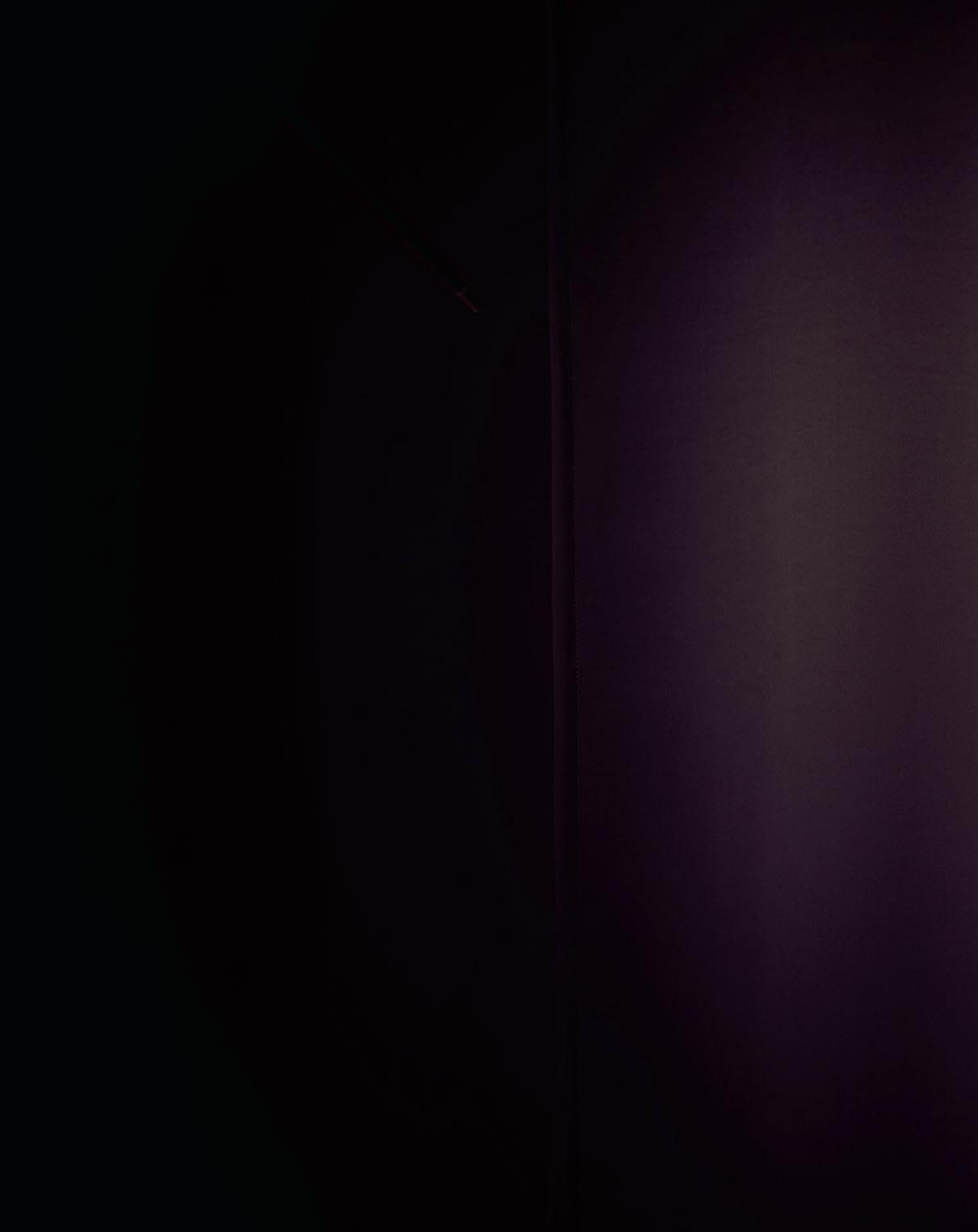
13 minute read
COVER STORY Kadri Kõusaar
A Mystery Desert
Andrei Liimets talks to director Kadri Kõusaar about her new feature Deserted that had its world premiere in Busan International Film Festival.
By Andrei Liimets Photos by Kadri Kõusaar
The film career of Kadri Kõusaar started with a bang after her debut feature Magnus was chosen as part of the Un Certain Regard program at the Cannes Film Festival back in 2007. She has since gone on to further international success, with her films picked for Tribeca and Karlovy Vary festivals. This year, Kõusaar returns with Deserted, a drama about kidnapping and love in the solitude of the desert.
An Estonian-Swedish-Finnish co-production, the film stars Frida Westerdahl as Ingrid, a journalist working in the Middle East who gets taken hostage by a group of Palestinian freedom fighters, and Ali Suliman as Ali, the most gentle of the captors with whom Frida develops a increasingly warm relationship.
We are meeting only a few days before the world premiere of Deserted at the Busan International Film Festival. How are you feeling – anxious, excited, at peace with the film finally finished? It is a mixture of anxiety and excitement. This is the first time the film reaches anyone not part of the production. It feels somewhat surreal. After each film you forget this feeling and then it comes back, although it is always a little bit different. On the other hand, the premiere also feels different. In my mind, a premiere includes the production team and the actors, but due to the COVID-restrictions, only one person per project is allowed to attend per film. Even media from numerous countries is forbidden. This is not ideal, but we are looking forward to having larger premieres in Europe and America. In a way it is nice that we get three premieres instead of one.
You hit a real jackpot with your debut feature Magnus, making it all the way to the official selection of Cannes film festival. Does it feel like a step back, not making it to say, Berlin, Venice or Cannes this time around? We made it to the final shortlist for Cannes! It was rather chaotic and there was a lot of competition with around 20 films making it all the way to the last round. Thanks to my first film I have maintained contact with the festival. It gives me the benefit of knowing that whenever I finish a film, they will really watch it, even if the answer is “no”. With some festivals, you don’t even know who, or if anyone, even watched your film, so it is a lottery without any personal contacts beforehand.
This is also an existential milestone for me because I have been a bit naïve until now. I have always thought that if you just make a good film it will find an audience. But it’s not as simple as that. There’s an array of other players involved – agents, A-list actors, the sheer money pumped into production and distribution. Especially if you make an English language film, then you are competing in a different league.
Once you’ve won the Golden Palm for example, no one will even wait to see the film, but will put it on the program. But there are very few such directors around. For the rest, it’s a wild competition, and like I mentioned before, there might be other factors or even political decisions involved.
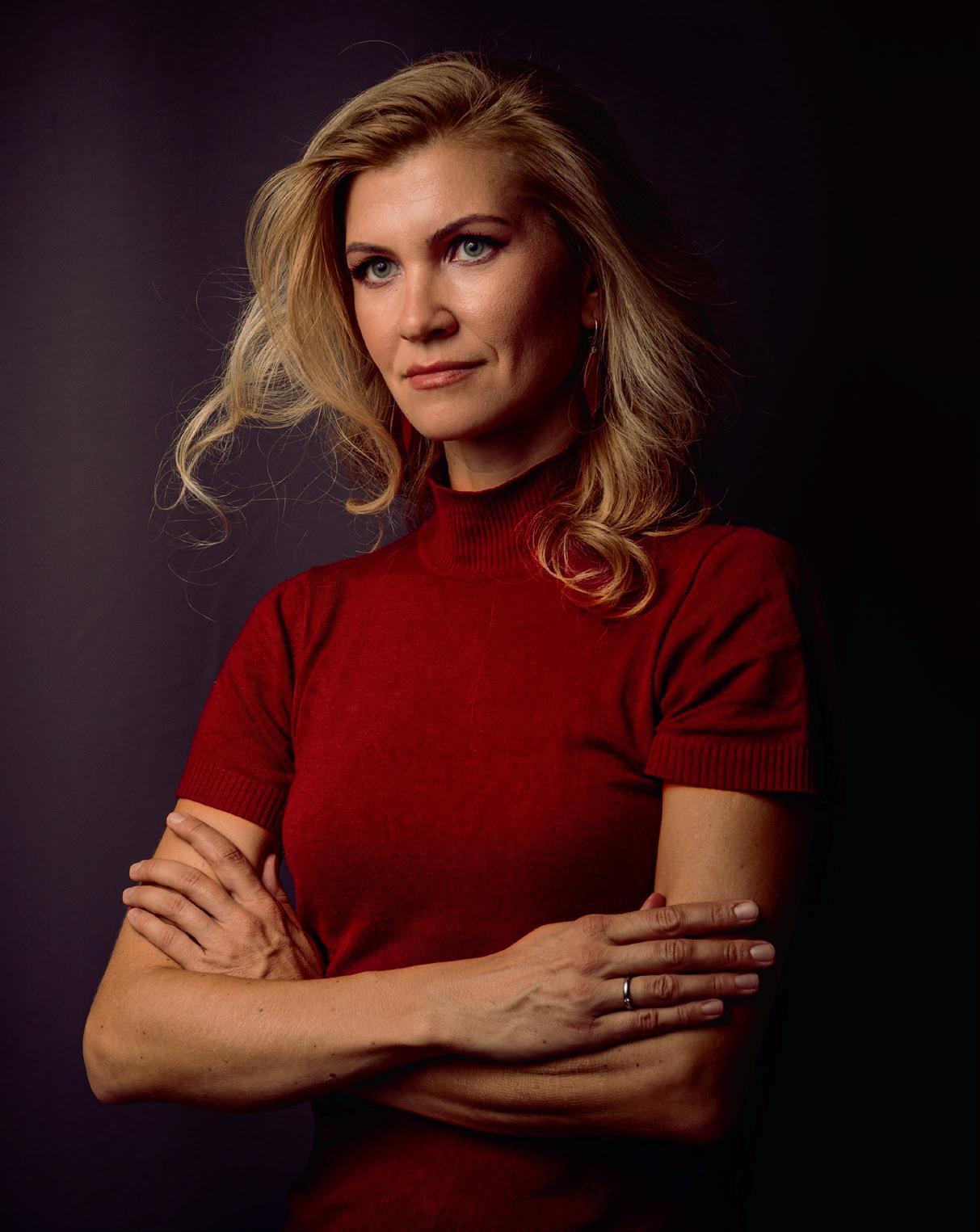
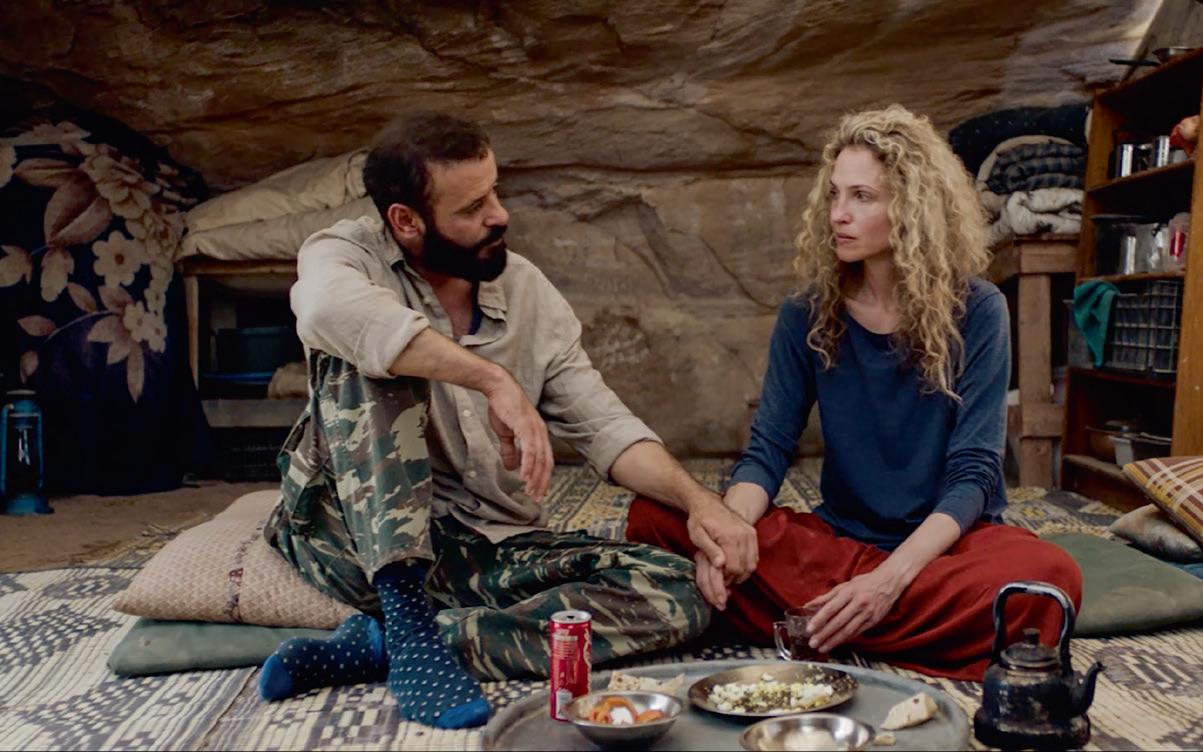
It already seems like quite an achievement, the film is complete because you lost a chunk of the budget during the production. To complicate things even more, you were filming in Jordan during the pandemic. How much did this change what we see on the screen? We were able to complete everything that takes place in the desert just as planned. In the script, however, there was roughly a fifth of the film, taking place in the West before and after the central events, which we didn’t get to film due to losing the funding.
Does it bother you in any way? Personally, I felt the story was better focused the way it was. I guess the end result might be better due to that. The viewer gets to decide. We had to cut one character entirely, so of course it bothers me a little bit, but multiple people have said the film turned out better, more focused. I already have an idea how to use some of the elements that were left out in the future.
How did you arrive at this story and why was it the one you wanted to tell on the screen? In terms of themes and locations it is very different to your previous works. I’ve always been drawn to the desert – since I was 25 and first visited Sinai and the Sahara. I kept going back, and thanks to a friend who lived in Sinai, I could stay there for four months. We were really able to go off the beaten track – deep into the desert with the
Frida Westerdahl plays Ingrid, a journalist working in the Middle East.
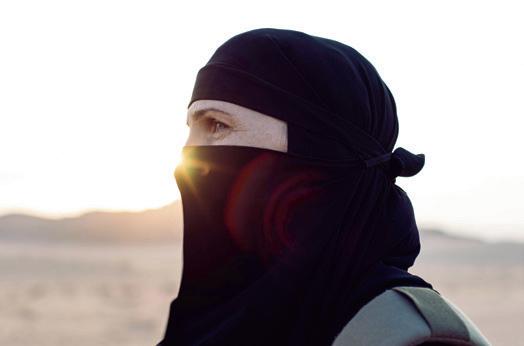
Bedouins. I have such warm memories of that. Generally it’s safe, once you have a local trusted guide, but for a film crew we weren’t able to get the necessary permits, and perhaps it would have attracted unwanted attention from the more dangerous players in Sinai. So we made the decision to film in Jordan, that’s geographically very similar, but unlike Sinai it has an established film infrastructure.
A more concrete inspiration behind the film was a series of articles in the BBC about a journalist who was kidnapped in Gaza. And also a book about the seven Estonian tourists kidnapped in Lebanon in 2011. My film, however, is more about two lonely souls connecting in the middle of the desert, a romantic love story, a bit like a fairy tale.
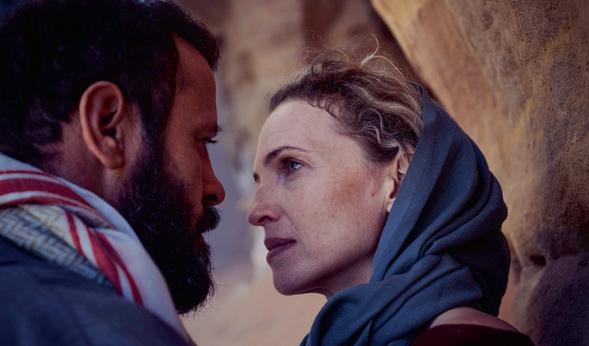
How were you able to cast Ali Suliman? He is a superstar in the Middle East, has played small parts in multiple Hollywood films, as well as starring in last year’s 200 Meters. Did you see him in the role from the beginning? Yes. In fact I couldn’t imagine anyone else in the role. We met in 2012 when we both acted in an Armenian short film. We kept in touch over the years, - once in London even shopping for baby clothes together for our kids, until I was finally able to confirm – yes, we have funding for the film! Then we started going through the script on Skype – me and Ali, and Frida who plays the female lead.
I discovered Frida by pure accident – by just seeing her photo on the web page of a theatre in Stockholm. I googled her and found her e-mail. We did have other candidates, but she instantly had the right feel. She is a very beautiful woman, and also very warm. Ingrid had to be vulnerable and sensitive. All too often successful work. They really trusted each other, and we were able to discuss all the details.
The psychological situation they are thrown into is intricate – there is a strong power dynamic, then there is the love story, and there is also a bit of Stockholm syndrome. How much did you discuss how the relationship would develop while remaining believable? I trust the actors very much. If there was an idea I put forward that they did not think would work, we discarded it. We were on the same page in terms of the central relationship not being built on sexual desire but rather being a friendship between two lonely people, a sort of close attachment, even clinging to each other in the middle of this desert where they are the only people. It is built on the need to share with someone. That’s where we started from and began to develop the relationship step by step while also building the tension.
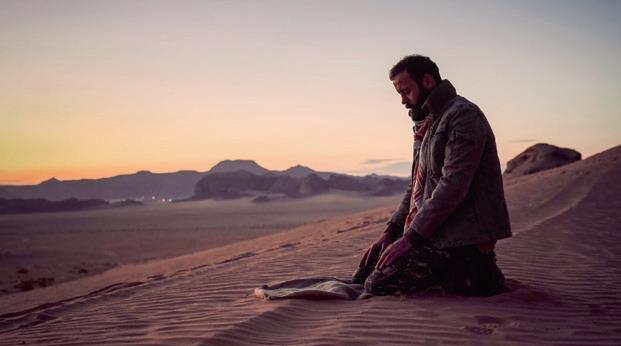
Arab-Palestinian film star Ali Suliman as Ali, the most gentle of the captors. career women are portrayed as cold and stiff in films. Still, she had to be sharp enough to be believable as a journalist who has seen pretty much everything.
It is one thing to find the actors who fit the roles individually, but this story lives or dies with the relationship between them. How did you build up the required chemistry, especially considering the pandemic and the actors coming from very different cultural backgrounds? I have no idea what we would have done had we discovered during the rehearsals on Skype that Ali and Ingrid do not fit with each other. Luckily for us, they complimented each other very well, got along well, and joked around together. I had no doubt it would
The people that kidnap Ingrid are actually rather likable. They are small-time crooks, there are no Bin Ladens there. We put most of the menace into one of them, Moussa. Ali is sympathetic from the beginning. He is there only to do this one job. Then again, there are things left unsaid – the main characters don’t discuss what has happened before, they never tell each other everything.
The film is poetic and romantic in parts but there is also a political layer. Were you not afraid to step into the minefield that engulfs the Israeli-Palestine conflict? I wasn’t afraid because otherwise I wouldn’t have been able to make this film. I think I remained on firm
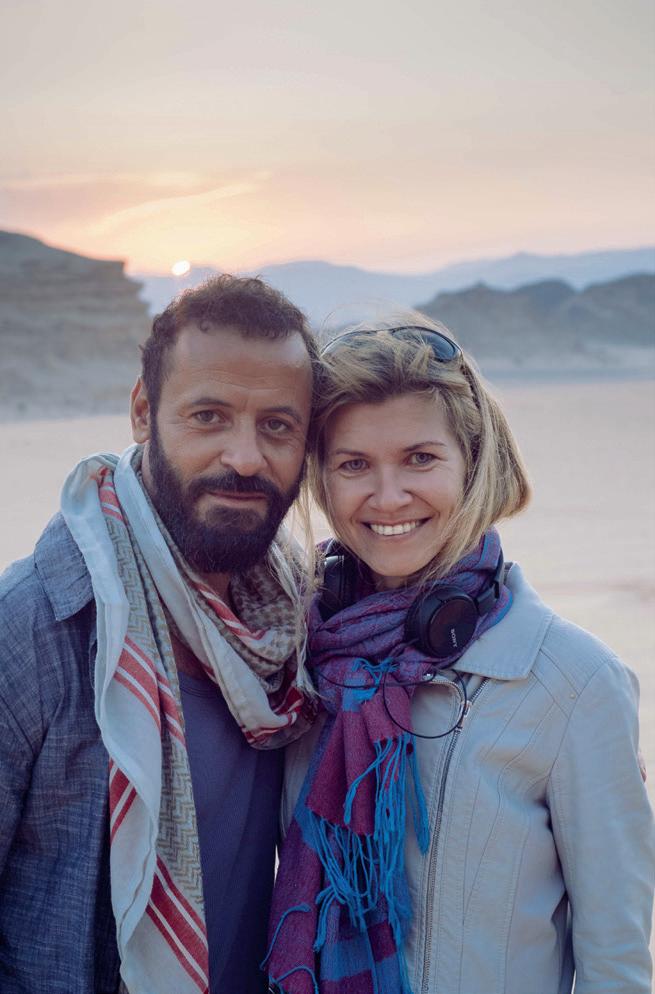
ground because I’m familiar with the context in Sinai, and therefore I was adamant in setting the film there. Yes, there are underlying issues like the illegal occupation and settlements of Israel, then the very widespread anti-semitism and anti-zionism amongst the Arabs, and in Sinai another colonial style conflict and power dynamic between Bedouins and Egyptians.
Even some people in our production thought that the immense suffering of civilians in Gaza mentioned in the film were a sort of “creative license”, although sadly these things are true. Another bombing session began right after we had finished editing.
You can argue that Hamas uses people as human shields, which might be true, but a mother who has lost her children is not at fault for that. It was important for me to show both sides. Of course, from an Israeli perspective, you could argue that Ingrid is more on the Palestinian side, but being a hostage, she wasn’t in a position to argue with her captors anyway.
Director Kadri Kõusaar with actor Ali Suliman on the set. Did you wish to take a stance on the Israeli-Palestinian conflict or rather distance yourself from it? I wished to be empathetic towards all sides. It is a hugely complicated situation. What I do take a stance against, and what I do want to reflect on, are the large numbers of civilians that get in the way, the “collateral damage”.
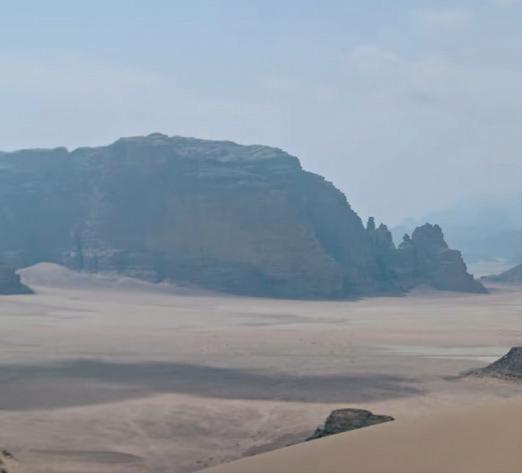
You have quoted a Tuareg thought that in the desert you will find your soul. What did you find in the desert? I think you will find your soul or at least come closer to it. I always get a sense of deep calm. The rest of the world disappears behind the mountains. There is only the eternity. The expanse gives you a different sense of calm than, for example, you get while walking in the forest. In the open space it is easier to fly.
This peaceful atmosphere permeated everyone on the set and provided a wonderful calm workflow. I am already thinking about a desert trilogy. The second part could take place in Morocco, which is also a very special place. I would also love to return to Jordan.
We talked about the budget being slashed. However, there are some special effects in the film, with the desert turning into a sea – or a sea of blood, to be more exact. Such effects are not cheap. Was it something you knew you had to include in the film? It was not as expensive as you would think, but the people behind it were very good! This particular vision – desert turning into sea – in fact goes back to my first desert trip when I visited the Great Sand Sea on the border of Egypt and Libya. Even with my 3-megapixel camera back then, I could really capture the sand looking like sea. Of course, in the film it takes on more of a symbolic meaning, and reflects Ingrid’s mindset rather than merely being a visual allegory.
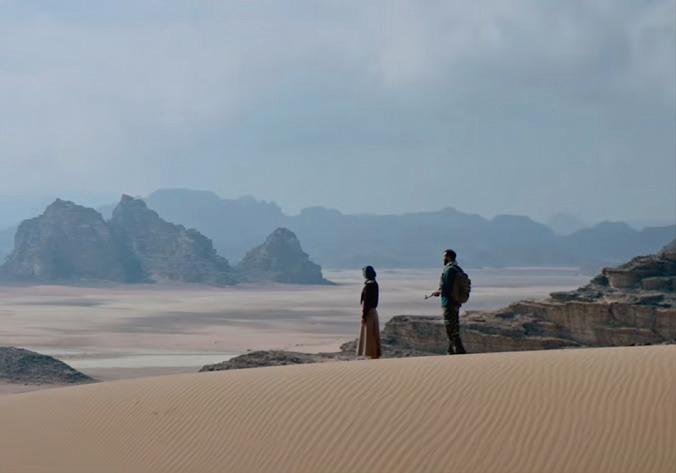
This is your second film in a row mainly from the perspective of a female lead. Most producers and directors are still men, but luckily more and more stories by and about women get made. Was it difficult to find funding for a film with a female director and a female lead? Yes, there has been progress regarding female authors and topics, but the funding problems in Estonia stem from other factors. As you probably know, Estonia is a very low production capacity country and recent political decisions have made it even more so. As
Deserted was shot in Jordan during the pandemic. an Estonian I am expected to do films in Estonian about Estonia, preferably about 19th century peasants or anything to show the heroism of Estonians under Soviet rule. If you veer off from that “safe standard”, you are immediately punished by either complete rejection or you get half the amount of money that “pure” Estonian films do. For example, we had to shoot in Jordan with an international cast and COVID restrictions with 2.5 times less money than Estonian films shot locally.
Then again, how can I blame the funding preferences when the whole Estonian film industry, including documentaries and animation, has less money than one Finnish TV-series.
As you already hinted, there have been heated debates about the funding of Estonian films. The yearly budget was about to be scrapped from seven million Euros to four, then remained at six. Do you consider it a victory? No. It’s embarrassing. Some headlines stated that Estonian films received an extra two million, while in actuality we lost one million due to austerity measures from the government. Sadly, this just illustrates a broader ignorance about the film industry, and does not acknowledge how an Estonian film can work as a marketing tool for Estonia, even if the film has no relation to Estonia in terms of plot. Estonian filmmakers can create things that equal Hollywood while being mobile and working with a small team. Think about the potential once we get the film pavilion. I have no idea why we should leave all that money to Lithuania, the Czech Republic, or anyone else.” EF
Kadri Kõusaar
l is an Estonian writer and director. l She has published numerous film, literature and music-related articles, as well as novels Ego (2001),
Free Rise (2004) and Alfa (2011). l Kadri has also worked as a radio-DJ and TV-host, and has a university degree in Spanish language and literature.
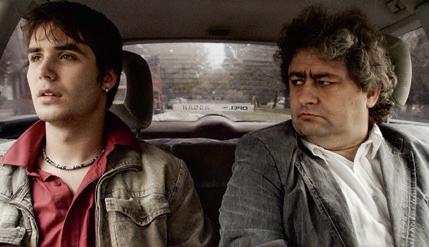
Magnus
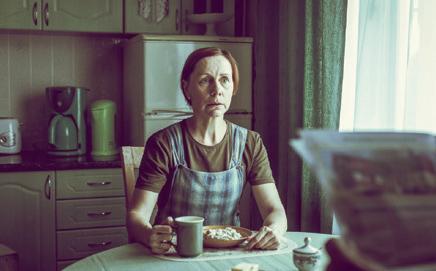
The Arbiter l Her debut feature Magnus (2007) was the first Estonian film ever included at the official selection of Cannes Film Festival (Un
Certain Regard). Magnus toured successfully in tens of film festivals around the world (including
Rotterdam, Warsaw, Busan,
Thessaloniki, Sarajevo, Moscow
“Tomorrow“, Seattle, Vancouver). l Kadri’s second film TheArbiter (2013) premiered internationally
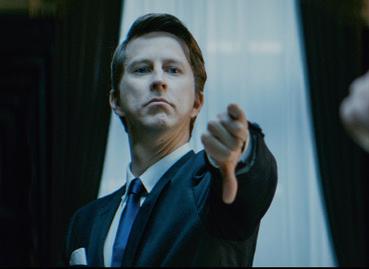
Mother in competition (East of the West) at the Karlovy Vary International
Film Festival. l Kadri’s third film Mother premiered in the official selection of Tribeca and toured in many festivals around the world. It was also the
Estonian selection for the Foreign
Film Academy Award. l Kadri’s fourth film Deserted premiered at Busan Film Festival 2021.










